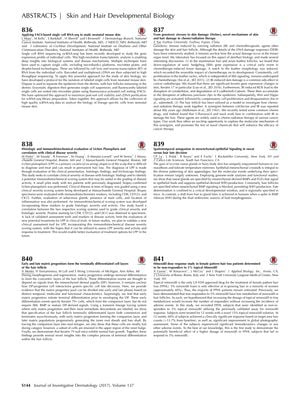Spatiotemporal Antagonism in Mesenchymal-Epithelial Signaling in Sweat Versus Hair Fate Decision
April 2017
in “
Journal of Investigative Dermatology
”

TLDR Sweat glands and hair follicles are determined by opposing signals, with BMPs promoting sweat glands and blocking BMPs leading to hair follicles.
The document presents several studies related to skin and hair biology. One study (abstract 838) conducted a small pilot study with ten patients to correlate clinical severity of Lichen Planopilaris (LPP) with histologic findings and developed an immunohistochemical scoring system for disease severity. They found a correlation between clinical and histologic severity. Another study (abstract 840) showed that hair follicle differentiation occurs asynchronously, with early matrix progenitors forming the companion layer and later progenitors forming the inner root sheath and hair shaft. Keratin 79 null mice exhibited normal hair growth, providing insights into hair follicle differentiation. A study on skin and hair damage from chemo/radiation therapy (abstract 837) discovered that down-regulation of Shh gene expression is an early event in chemotherapy-induced tissue damage and that IR-induced skin damage involves significant keratin gene expression changes, disruption of cytoskeleton, and degradation of E-cadherin/b-Catenin. Lastly, a study (abstract 839) found that sweat glands and hair follicles are specified by opposing signals: BMPs and FGFs promote sweat gland fate by suppressing SHH-production, while hair follicles are specified when BMP signaling is blocked, allowing SHH-production. This fate determination is regionally specified in mice and shifts from hair to gland fates in humans due to a spike in BMP that silences SHH during embryonic development.



